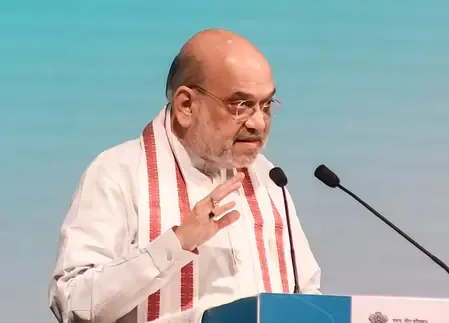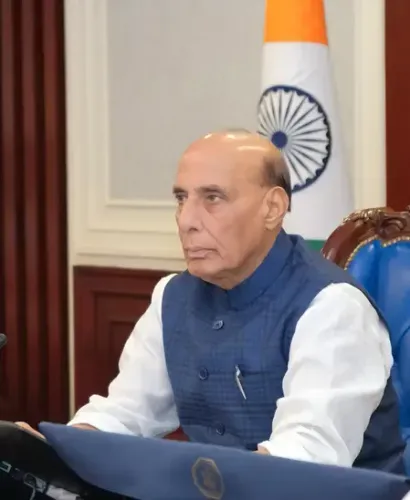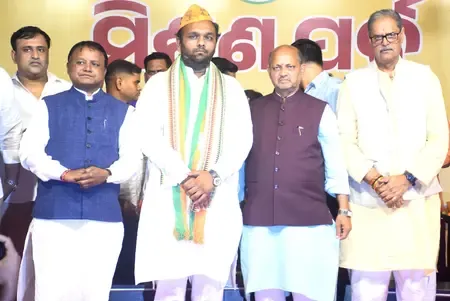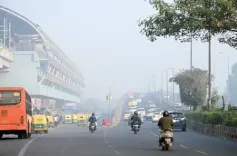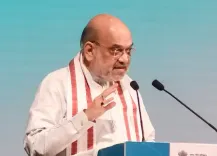Did Manmohan Singh Thank Yasin Malik After Meeting Hafiz Saeed? Amit Malviya Highlights Affidavit
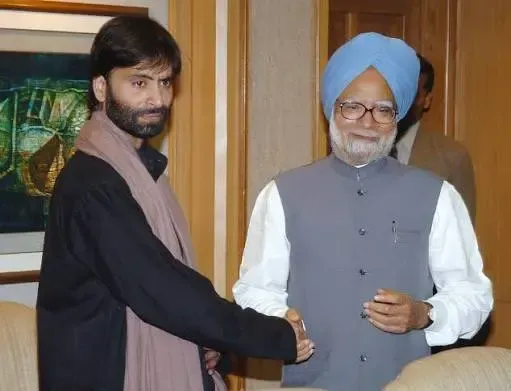
Synopsis
Key Takeaways
- Yasin Malik's affidavit reveals alarming claims about back-channel diplomacy.
- Malik's meeting with Hafiz Saeed raises national security concerns.
- Amit Malviya emphasizes the need for accountability in government actions.
- The historical context of Malik's claims sheds light on past political strategies.
- Malik's acknowledgment of his fate highlights the complexities of separatist politics.
Srinagar, Sep 19 (NationPress) Yasin Malik, the imprisoned leader of the outlawed Jammu & Kashmir Liberation Front (JKLF), has disclosed some startling assertions in his affidavit submitted to the Delhi High Court. Malik is currently serving a life sentence related to a terror funding case.
Amit Malviya, a prominent BJP leader overseeing the party’s IT cell, remarked on X on Friday, “The JKLF terrorist Yasin Malik, who is serving a life sentence for terror funding, has made a shocking revelation. In an affidavit filed in the Delhi High Court on August 25, he claims: He met with Hafiz Saeed, the founder of Lashkar-e-Taiba and mastermind of the 26/11 attacks, in Pakistan in 2006. This meeting was not initiated by him but arranged at the behest of senior Indian intelligence officials as part of a back-channel peace initiative.”
“Following this meeting, then-Prime Minister Manmohan Singh personally expressed his gratitude to him. Yasin Malik, a hardened terrorist guilty of murdering three Air Force personnel in uniform, is waging war against the state and must face the full force of the law,” the BJP leader stated in his post.
“If these new assertions hold true, they raise severe concerns regarding the UPA’s approach to national security and back-channel diplomacy,” he added.
In his affidavit to the Delhi High Court, Kashmiri separatist leader Yasin Malik has painted a shocking picture of his lengthy involvement in India’s backchannel diplomacy — featuring intimate dinners with ministers and intelligence chiefs and a phone call with industrialist Dhirubhai Ambani. The JKLF chief was convicted and sentenced to life by the National Investigation Agency (NIA) court for receiving foreign funding and maintaining links with militant groups.
The NIA has appealed to the Delhi High Court to enhance his life sentence to a death sentence.
Malik claims he accepts his destiny “gleefully,” insisting that his journey was not solitary but shaped through substantial state-sanctioned engagement.
He begins with a tone of fatalism: “I recognize that the balance of scales isn’t tipped in my favor and a statement is to be made regarding Kashmir using me as a precedent… being a passionate romantic, I would accept it as the ultimate endgame of my fate, gleefully.”
He places his current trial in the context of the abrogation of Article 370 and 35A, which he claims unleashed “fear, intimidation, and the arrests of thousands of political leaders, activists, teachers, lawyers, and journalists.”
In the early 1990s, Malik recalls being transported from Mehrauli sub-jail to a bungalow in Maharani Bagh, where then-Home Minister Rajesh Pilot, IAS officer Wajahat Habibullah, and senior IB officials urged him to surrender his arms.
He claims that P.V. Narasimha Rao, then Prime Minister, had issued specific orders to reintegrate him into democratic politics.
After three years of negotiations, he was released in May 1994, declaring a unilateral ceasefire in Srinagar and vowing to pursue “a non-violent democratic peaceful struggle, come what may.”
The government honored this commitment. Bail was granted in all 32 pending TADA cases, and none were pursued. Malik asserts that this truce was maintained for 25 years — across the administrations of Rao, Vajpayee, Gujral, Manmohan Singh, and even PM Modi's first term.
During one such meeting, R.K. Mishra, a trusted aide of Prime Minister Atal Bihari Vajpayee, handed him a phone. On the other end was Dhirubhai Ambani, who spoke warmly about his “humble and nimble beginnings” and emphasized that “sheer hard work often leads to rewarding results.” This call, Malik suggests, symbolizes the unusual breadth of his connections — from ministers to tycoons.


